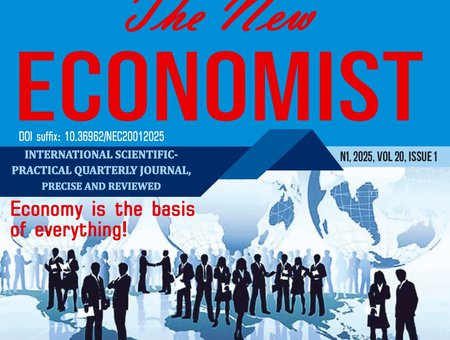Georgia's Perspective in the Context of Developing Economic Relations between China and the European Union

Loid Karchava
Doctor of Business Administration, Associate Professor, Caucasus International University

Shota Veshapidze
Doctor of Economic Sciences, Associate Professor, Ivane Javakhishvili Tbilisi State University

Salome Tsikelashvili
PhD student at Ivane Javakhishvili Tbilisi State University
Abstract
This article explores the various dimensions of Georgia's relationship with China and the European Union, analyzes the country's role as a mediator in facilitating economic cooperation, and discusses the regional geopolitical implications of its position. Georgia's active participation in the "One Belt, One Road" initiative. Its strategic use of trade agreements and efforts to harmonize its policies with EU standards are central to its efforts to seize this unique economic moment. The interaction between these global forces is likely to determine Georgia's future economic and political trajectory, as well as impact regional stability and development in the Caucasus and Central Asia as a whole.
The development of economic ties between China and the European Union presents opportunities for Georgia to succeed, which is related to global projects initiated by China. Of these, the most important is the Belt and Road Initiative (BRI), a global project initiated by China. An initiative aimed at developing infrastructure and strengthening economic cooperation between Asia, Europe and Africa. Georgia, as a country located at the crossroads of Europe and Asia, is an important participant in the "One Belt, One Road" initiative. The country has a strategic location, which is considered an intermediate link between China and the European Union. Georgia's role in the "One Belt, One Road" initiative is determined by its geostrategic location, transport and infrastructure, and influence on the international economy.
Georgia is located in a central region, connected to both Asia and Europe. Its geographical location gives it a unique position as a transit hub, which, within the framework of the initiative, will strengthen ties between China and the European Union. The railways and roads that pass through Georgia play an important role for China in economic ties with neighboring countries such as Turkey and Iran. Important infrastructure projects located between Georgia and China, such as the so-called "New Silk Road", which aims to renew land and sea routes, promote trade turnover and improve routes. China is actively investing in Georgia in the transport and logistics sector, which is increasing the capabilities of Georgian infrastructure. "One Belt, One Road" is creating new economic opportunities in Georgia that are contributing to the growth of the Georgian economy. By participating in such projects, Georgia is trying to maximize the benefits of investments and cooperation. Georgia's participation in the "One Belt, One Road" initiative increases its international role and its function as a connecting link between China and Europe. Carrying out this role contributes to strengthening Georgia's positions in relations with both Western and Eastern partners.
Georgia's role in this context is important. The European Union is a priority partner for Georgia, especially as Georgia seeks to strengthen political and economic cooperation. The European Union supports Georgia's economic development, democratic reforms and ensuring regional stability. Georgia's active participation in the "One Belt, One Road" initiative strengthens it as an actor in multilateral cooperation. This allows Georgia not only to connect China and the European Union, but also to successfully use both economic and diplomatic channels. Chinese investments in Georgia, often accompanied by the involvement of the European side, create a positive situation in the areas of transit infrastructure, energy, trade relations, and other sectors.
References
- Babuadze, N., Veshapidze, Sh. (2010). Some Aspects of Chinese Business Psychology. “New Economist”, No. 2. (In Georgian).
- Babuadze, N., Veshapidze, Sh. (2015). Shanghai Cooperation Organization: Will China Rival the US? “Historic Verticals N1. (In Georgian).
- Babuadze, N., Veshapidze, Sh., Kvatchadze, N. (2015). Confucianism and Taoism: Postulates, Principles, Precepts, Values. Business-engineering, N1. (In Georgian).
- Bedianashvili, G. (2023). Macrosystem Socioeconomic Challenges of the Post-pandemic Period. Proceedings of the National Scientific Conference: “The World Economy in the Post-Pandemic Period: Results and Challenges”. Ivane Javakhishvili Tbilisi State University, Faculty of Economics and Business. 41-46.
- Bedianashvili, G. (2018). Culture as a Factor in the Formation of the Knowledge Economy with the Systemic and Institutional Context of Paradigmatic Changes. Globalization and Business. 6, 58-66. DOI: 10.35945/ gb. 2018.06.007 6
- Bedianashvili, G. (2021). Macroeconomic and cultural determinants of the covid-19 pandemic crisis. Bulletin of the Georgian National Academy of Sciences. 15(2):191-197.CAP 2023-2027. https://agriculture.ec.europa.eu/ common-agricultural-policy/cap-overview/cap-2023-27/key-policy-objectives- cap-2023-27_en
- Bedianashvili, G. (2022). The COVID-19 Pandemic, Globalization and the Socio-Economic System of the Country (Macro Aspect). Proceedings, p.38–42.
- Danelia, I. (2021). Impact of COVID-19 on Container Shipping Industry Case of Georgia. DOI: 10.13140/RG.2.2.27147.00807
- Danelia, I. (2021). Intercontinental Transportation of Containerized Cargo and The Middle Corridor. DOI: 10.13140/RG.2.2.25469.28640. Conference: “Increasing the competitiveness of international rail transport in the framework of TRACECA”.
- Gaganidze, G. (2018). Foreign Trade of Georgia, Moldova and the Ukraine with the European Union after Signing the Association Agreement. Ecoforum Journal, Volume 7, Issue 1(14).
- Gaghanidze, G. (2019). Export Growth: The Necessity of Creating New Export Products. “Globalization and Business”, volume 4 N7.
- Garakanidze, Z; Bilynska, M. (2024). Exploring Individual Resilience as A Component of National Resilience In Ukraine During The Wartime. Business-Engineering, N3-4, 2024. pp.11-16; https://business engineering. bpengi. com/home/2024/number-03-04;
- Garakanidze, Z; Bilynska, M. (2024). Possible New Role of the GTS (Ukraine) for the EU Energy Security. Bucharest, Romania. https://www.geopolitic. ro/2024/09/possible-new-role-gts-ukraine-eu-energy-security/;
- Garakanidze, Z; Garakanidze, N. (2023). The Prospect of Turning Georgia into A Gas Hub. Business-Engineering, N1-2, https://business-engineering. bpengi.com /home /2023/ number-01-02. pp.34-40; https://drive.google.com /file/d/ 1BW0qEDPR9OjlPKZXqBIoFIPuJ8Vs1Sr7/view;
- Garakanidze, Z.; Garakanidze, N. (2023). Whether or Not Regional Gas Hub Is Formed on The Black Sea? Bucharest, Romania. http://www.geopolitic. ro/2023/05/whether-not-regional-gas-hub-formed-black-sea/
- Garakanidze, Z., Garakanidze, N. (2018). Ekonomichnyj separatyzm ta joho vyiavlennia [Economic Separatism and its Detection]. Bulletin of the NAPA, Series “Рublic Аdministration”,3 (90), 2018, Kiev, Ukraine. pp. 32-42; http:// visnyk.academy.gov.ua/pages/dop/81/files/1c61030f-cfd0-49b0-b853-32e88ee63f54.pdf.
- Garakanidze, Z. and Pavliashvili, S., 2024. Demonopolization of the EU Gas Market in the Conditions of the Russia-Ukraine War. Economics & Business (1987-5789), (2).
- Gvelesiani, M., Veshapidze, S. (2016). European Values: What Can WeImplement from Them and How Can We Implement Them in Georgia. “Globalization & Business”. (1). 40-46. (In Georgian).
- Gvelesiani, M., Veshapidze, S. (2016). Values: Limits and Contradictions. Globalization & Business, (1). 35-39. (In Georgian).
- 20. Jamagidze, L. (2016). B/Orders and Economic Integration Preferences: The Case of Georgia. Ecoforum Journal, 5(3).
21. Jamagidze, L. (2022). Georgia-Romania Economic Cooperation and the New Regional Challenges. EURINT, 9(1), 133-150.
22. Karchava, L., Veshapidze S., ChHiabrishvili, K. (2023). Economic Perspective of Establishing Strategic Partnership Between China And Georgia. DOI suffix: 10.36962/NEC18032023-7. The New Economist N 3 (2023), Vol 18, Issue 3 (In Georgian).
23. Karchava, L., 2018. Theoretical basics of business communication and Its connection with other sciences/ბიზნესკომუნიკაციების თეორიული საფუძვლები და მისი კავშირი სხვა მეცნიერებებთან. The New Economist, 13(3), pp.69-2.
24. Kharaishvili, E; Gechbaia, B.; Tsiklashvili, N.; Katamadze, G. (2024). Digital Transformation of the Agricultural Sector and Its Impact on Productivity in Georgia. BIO Web Conf., 114 (2024) 01002. DOI: https://doi.org/10.1051/ bioconf/202411401002
25. Khikhadze, L. (2018). The World Trading Organization’s Mission in the Conditions of Globalization and its Influence on the Transitional Economical Countries, World Economy and International Economic Relations, International Scientific Collection, Kiev
26. Kozak, Y., Shengelia, T., & Gribincea, A. (2014). International economic relations. Kiev-Katowice: CUL.
27. Lomia, T. and Lomia, E., 2020. Economic and Political Support of the European Union to Georgia: Retrospective Analysis of the EU-Georgia Relations. Vallis Aurea, 6(1), pp.35-43.
28. Lomia, E., 2021. CHINA’S BELT AND ROAD INITIATIVE AND GEORGIA: A SHORT OVERVIEW. Journal of Liberty and International Affairs, 7(3), pp.373-385.
29. Lomia, E. and Karchava, L., 2021. Georgian ethnopolitical conflict as a subject of confrontation between the USA and Russia. Journal of Liberty and International Affairs, 7(2), pp.90-102.
30. Lomia, E. and Lomia, T., 2021. EU Policy in the South Caucasus Region and Georgia's Participation in the European “Neighborhood Policy” and the “Eastern Partnership” programmes/European Union policy in the South Caucasus region and Georgia's participation in its programs. The New Economist, 16(1), pp.62-2.
31. Papava, V. (2016). Georgia’s Choice: the European Union or the Eurasian Economic Union. GFSIS, Expert Opinion, 57, https://gfsis.org.ge/files/library/ opinion-papers/57-expert-opinion-eng.pdf.
32. Papava, V. (2018). Assessment of Economic Growth in the Post-Communist Members of the European Union and the Eastern Partnership States (May 23, 2018). GFSIS Expert Opinion 101.
33. Papava, V. (2018). The Economics in Crisis and the Main Directions for Transformation of Economic Science. Transformations, 3-4(98-99): 90-108.
34. Papava, V. (2020). Becoming European: Challenges for Georgia in the Twenty-First Century. iUniverse. Bloomington.
35. Papava, V. (2020). Georgia’s European Way During the Period of Pandemic Deglobalization. Rondeli Blog, August 6, https://gfsis.org.ge/blog/ view/1091.
36. Papava, V. (2022). Pandemic, War and Economic Sanctions: From Turbulent to Confrontational Globalization. Eurasia Review, May 23, Available at: https://www.eurasiareview.com/23052022-pandemic-war-and-economic- sanctions-from-turbulent-to-confrontational-globalization-oped/.
37. Papava, V. (2022). On Economic Growth in the G20 Countries in 2022, Adjusted for the Catch-Up Effect. Eurasia Review, August 4. Available at: https:// www.eurasiareview.com/04082022-on-economic-growth-in-g20-countriesin- 2022-adjusted-for-catch-up-effect-analysis/.
38. Papava, V. (2022). On the Main Challenges of the Architecture Transformation of the World Economy. Eurasia Review, March 31, Available at: https:// www.eurasiareview.com/31032022-on-the-main-challenges-of-the-architecture-transformation-of-the-world-economy-oped/?fbclid=IwAR1Q-caff-Bi-PLQh121S5SVHxXZiJG0ALCBAiSptdq5pNjduMmqtZPvcal0
39. Papava, V. (2022). Pandemic, War and Economic Sanctions: From Turbulent to Confrontational Globalization. Eurasia Review, May 23, https:// www.eurasiareview.com/23052022-pandemic-war-and-economic-sanctions-from-turbulent-to-confrontational-globalization-oped/.
40. Papava, V. (2022). On Sanctionomics. Eurasia Review, March 14. Available at: https://www.eurasiareview.com/14032022-on-sanctionomics-oped.
41. Papava, V. (2022). Cold War vs. Hot War in 2022. Eurasia Review, February 28. Available at: https://www.eurasiareview.com/28022022-cold-war-vshot- war-in-2022-oped
42. Papava, V., Maisaia, V. (2023). On Economic Security under Confrontational Globalization and the Main Concepts of Geo-Economic Warfare. Bulletin of the Georgian National Academy of Sciences, 17(3), 116-120.
43. Pavliashvili, S. and Tokmazishvili, M., 2024. MODERNIZING FARMERS'EDUCATION IN THE EU: CHALLENGES AND APPROACHES. German International Journal of Modern Science/Deutsche Internationale Zeitschrift für Zeitgenössische Wissenschaft, (82).
44. Pavliashvili, S. and Tokmazishvili, M., 2024. Challenges of farmers' education system in Georgia. Foundations and Trends in Modern Learning, (5).
45. Pavliashvili, S. and Garakanidze, Z., 2024. The Impact of the Russia-Ukraine War on the EU Gas Spot Market. Economics & Business (1987-5789), 16(1).
46. Pavliashvili, S. and Tokmazishvili, M., 2024. GLOBAL ECONOMIC AND LEGAL PROBLEMS OF INTRODUCING THE CIRCULAR ECONOMY AND GEORGIA. Norwegian Journal of development of the International Science No, 145, p.51.
47. Solomon Pavliashvili, Zurab Garakanidze (2024). ГЕОЭКОНОМИКА СРЕДНЕГО КОРИДОРА. МИНИСТЕРСТВО ВЫСШЕГО ОБРАЗОВАНИЯ, НАУКИ И ИННОВАЦИЙ РЕСПУБЛИКИ УЗБЕКИСТАН.
48. Putkaradze, R. (2010). Perspectives of Georgia-European Union Trade Relacions. Istanbul International Annual Conference on the Economic Cooperation and Development within the Black Sea Basin Countries. Donetsk Nacional University. Collection of Scientific Works. Part I. Istanbul-Donetck. S. 123-127.
49. Putkaradze, R. (2015). Historical Aspects of Trade and Economic Relations between Georgia and the European Union. ZeszytyNaukowe UNIWERSYTETU PRZYRODNICZO-HUMANISTYCZNEGO w SIEDLCACH Seria: AdministracjaiZarządzanie. Scientific Journal, Nr 107. pp. 97-105
50. Putkaradze, R. (2018). Pressing Issues of Economic Integration of Croatia And Georgia. Науковий журнал. ВІСНИК. Scientific journal, HERALD. Of Khmelnytskyi National University, Economic sciences, Issue 5, Part 1 (262).
51. Putkaradze, R. (2018). Trade Relations Between Georgia And The European Union After Signing The Association Agreement. South East European University. 2nd International Scientific Conference on Business and Economics. May 25. conf.seeu.edu.mk. CONFERENCE PROCEEDINGS. Tetovo, Republic of Macedonia. p. 183-188.
52. Putkaradze, R. (2019). Georgia in the European Union’s Eastern Partnership Countries: Historical Aspects and Challenges. Journal, Ecoforum Journal. Volume 8, Issue 1(18).
53. Putkaradze, R. Chania, M. (2018). The Priorities of Georgian Economic Development in Conditions of Globalization. European Journal of Marketing and Economics, v. 1, n. 1, p. 63-66, july.
54. Rodrik, D. (2022). Beware Economists Bearing Policy Paradigms, May 11, 2021. https://www.project-syndicate.org/commentary/economic-policy-must-abandon-universal-paradigms-by-dani-rodrik-2021-05
55. Rodrik, D. (2021). Beware Economists Bearing Policy Paradigms. Project Syndicate.
56. Sepashvili, E. (2017). Eastern Partnership Integration with the EU and Inclusive Growth of National Economies. Management Dynamics in the Knowledge Economy, 5(3), 439-453.
57. Shaburishvili, S. (2011). Peculiarities of Georgian Foreign Trade with the European Union. Bulletin of Khmelnitsky National University, 2, 252-254.
58. Shengelia, T. (2017, July). Determination of correlative relations between social capital, trust and motivation in the international company. In Proceedings of Business and Management Conferences (No. 5607685). International Institute of Social and Economic Sciences.
59. Shengelia, T. (2018). Social Capital of Dominant Ethnic Groups and Its Impact on Business.
60. Shengelia, T. (2019). Research methodology and the impact of social entrepreneurship on the solution of social problems in Georgia.
61. Shengelia, T., & Gelashvili, M. (2020). Export potential of Georgia. In World economy and international economic relations (Vol. 3, pp. 29-33).
62. Shengelia, T., Kozak, Y., & Kirkitadze, Z. (2020). FDI motivation effects on Host countries. In World economy and international economic relations (Vol. 3, pp. 15-20).
63. Shengelia, T., Berishvili, K., Jganjgava, K. (2022). Improving the Methodology of Measuring Social Capital in International Companies. Sciences of Europe, (97), 15-18.
64. Silagadze, A. (2022). Contemporary Global Economic Trends: Transitional Economies during Covid-Depression Bull. Georg. Natl. Acad. Sci, 16(3), 130-135
65. Silagadze, A. (2011). Economic Teachings, Ilia Chavchavadze and Modernity- “Actual problems of Historical and economic Teachings “. “VZFEI”, pp.71 -77.
66. Silagadze, A. (2018). Gini Index–Wealth Distribution in the Post-Soviet Countries. Bulletin Of The Georgian National Academy Of Sciences, vol. 12, no.3.193
67. Silagadze, A. (2022). Economics Contemporary Global Economic Trends: Transitional Economies during Covid-Depression. Bulletin Of The Georgian National Academy Of Sciences, vol. 16, no. 3, p. 130–135.
68. Silagadze, A., Atanelishvili, T. (2010). Aspects of Economic Doctrines in Georgia. Peninsula University of Technology, Business and Informatics. San Francisco (USA).
69. Silagadze, A., Atanelishvili T., Silagadze N. (2022). Covid Depression and Search for a New Paradigm. Bulletin of The Georgian National Academy of Sciences,16(1): 121-125.
70. Silagadze, A., & Zubiashvili, T. (2015). Parametrs of the European Union and the post-soviet Georgia's economy. International Journal of Multidisciplinary Thought, 5(3), 441-448.
71. Veshapidze, S. (2017). The Traditions Orientated on European Values In Georgia. Sciences of Europe, (13-4), 14-18.
72. Veshapidze, S., Bakhtadze, L., Putkaradze, R., Kharitonashvili, J., Danelia, I., Lominashvili, M., Chantladze, N. (2024). Modern International Economic Relations of Georgia. Smarty (in Georgian)
73. Veshapidze, S., Chiabrishvili, K., Zubiashvili, T., Zoidze, G. (2021). On the Relationship between Education and Economic Security. Ecoforum Journal, 10(3).
74. Veshapidze, S., Bendianishvili, N., & Zoidze, G. (2024). BILATERAL INVESTMENT AGREEMENTS OF GEORGIA: THREATS, CHALLENGES AND OPPORTUNITIES. Three Seas Economic Journal, 5(4), 1-7.
75. Veshapidze, S., Karchava, L. (2022). Contradictions of Globalization under the COVID-19 Pandemic. Bulletin of the Georgian National Academy of Sciences, 16(4), 152-157.
76. Veshapidze, S., Kitashvili, S. (2024). Georgia’s European Integration Perspective. Ekonomisti. 2 (XX), 94-112 p ISSN 1987-6890 e ISSN 2346-8432
77. Veshapidze, S., Kitashvili, S. (2025). The Importance and Benefits of the EU single market for Georgia. The New Economist, 19(3), 60-73.
78. Veshapidze, S., Kereselidze, L., Tsirdava, N. (2024). Decarbonization of Energy and Challenges of Sustainable Development of Georgia. Ekonomisti 4. P ISSN 1987-6890 e ISSN 2346-8432
79. Veshapidze, S., Megreladze, G. (2024). Prospects for the development of Georgia’s trade with the European Union. The New Economist, 19(2), 11-223. ISSN 1512-4649(Print) ISSN 2667-9752(Online)
80. Veshapidze, S., Otinashvili, R., Gvarutsidze, A., Abuselidze, G., Zoidze G. (2022). Modern Technologies to Overcome the Challenges of Globalization. Entrepreneurship. Volume: 10, Number: 2.https://www.ceeol.com/search/article- detail?id=1074987
81. Veshapidze, S., Zoidze, G. (2022). Value Choices of the Community in the Context of the COVID-19 Pandemic. DOI: https://doi.org/10.5281/zenodo. 6373197
82. Veshapidze, S., & Zoidze, G. (2022). On State Intervention in the Economy through the Budget in Georgia. World economy and international economic relations.-International Scientific Collection, 5.
83. Veshapidze, S., Zoidze, G., Berishvili, K. (2021). The Economic Determinant of the Education System. Sciences of Europe, (81-2), 6–12. DOI: https:// doi.org/10.24412/3162-2364-2021-81-2-6-12
84. Veshapidze, S., Zubiashvili, T. (2021). About Population Growth and Global Problems. VI International Scientific Conference: “Challenges of Globalization in Economics and Business”, Tbilisi, 2021, pp. 148-155
85. Veshapidze, S., Zubiashvili, T., Chiabrishvili, K. (2021). Globalization and New Opportunities for Georgia. Globalization and Business. 12, 32-36. https:// doi.org/10.35945/gb.2021.12.003
86. Zoidze, G. (2021). Importance of Euro-Atlantic Integration: Democracy, Security and Economic Development. Three Seas Economic Journal, 2(3), 1-7.
87. Zoidze, G. (2023). Strategic Directions of Balanced Economic Growth of Entrepreneurial Entities. Journal of Innovations and Sustainability, 7(1), 01-01.
88. Zoidze, G., Abuselidze, G., Veshapidze, S. (2023). Economic Vulnerability of Small Powers. Journal of Geography, Politics and Society, 13(3), 1-12
89. Zoidze, G., Veshapidze, S. (2022). The Modern Economy and Values. Cambridge Scholars Publishing. p. 125.
90. Zoidze, G., & Veshapidze, S. (2022). Transformation of economic policy priorities under COVID-19. Three Seas Economic Journal, 3(2), 35-43.
91. Zubiashvili, T., Veshapidze, Sh. (2019). Labor Emigration and Employment in Georgia. (Co-authorship). Humanities and Social Sciences Review, Volume 09, Number 01, USA. pp. 127-136. http://www.universitypublications. net/hssr/0901/html/E9X94.xml
The new Economist, No1, 2025, Vol. 20, Issue 1.

07/04/2025
Copyright (c) 2025 Loid Karchava, Shota Veshapidze, Salome Tsikelashvili

This work is licensed under a Creative Commons Attribution-NonCommercial-NoDerivatives 4.0 International License.
